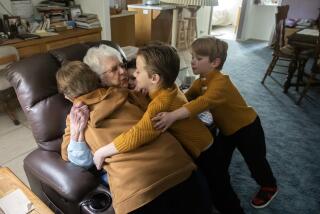With Teachers’ Help, Kids Receive Advice on Solving Family Problems : Counseling: Sessions also give students a chance to talk about grief, depression, anger and drug abuse.
- Share via
SOUTH GATE — A 14-year-old South Gate Junior High School student is distraught because her father spends the family money on his car, his friends and beer. Whenever she broaches the subject, she says, the conversation ends in an argument.
Angry and confused, she doesn’t know what to do.
But counselor Stewart Bubar implores her to try new approaches--express her anger in a letter or try talking things out without losing her cool.
“If you yell at your parents, you lose, because you are giving them ammunition to use against you,” Bubar says. “Tell yourself, ‘No matter what is said, I’m not going to get angry.’ ”
The girl is enrolled in the school’s “family problems” counseling group, part of the Los Angeles Unified School District’s Impact Program, where troubled students in junior, middle and senior high schools can get advice on dealing with a wide range of family matters.
At South Gate Junior High, the program appears to be a big success. About 900 students--nearly a quarter of the school’s enrollment of 3,800--attended Impact groups last year, said Bubar, the school’s Impact coordinator.
For the 14-year-old girl, the weekly meetings have become an important--and safe--place to discuss her family.
“I want to find ways to solve these problems, “ said the eighth-grader, who like all the participants asked to remain anonymous. “I can’t lose my temper. I’m just going to tell my dad how I feel.”
Bubar and more than 30 teachers who volunteer their time run groups on topics such as grief, depression, anger, and alcohol and drug abuse. The meetings are conducted in English and Spanish.
Most of the students decide on their own to attend the sessions, which are held during class time. Some are referred by teachers.
“I wanted to get my feelings out,” said a 13-year-old whose stepfather refuses to speak to her because she ran away for a week earlier this year. “He doesn’t listen to me.”
One 14-year-old said he comes to the group because he wants to talk about his father, who he said drinks a lot and spends little time at home. Another 13-year-old complains that she receives the brunt of anger from her mother, who is upset over another daughter’s pregnancy.
“A lot of the stuff they are blaming on you has nothing to do with you, but with what’s going on in the family,” Bubar tells the nine students in the group. “You may have to be the real adults here. You may have to say, ‘Dad or Mom, we need to sit down and talk.’ But make a deal that neither of you will yell. It may be tough the first or second time, but it’ll get easier.”
Bubar offers to mediate disputes between teen-agers and parents, and he encourages the youths to bring their parents in for meetings.
“Most kids who are having problems feel isolated,” Bubar said. “This group shows their commonality. The only difference between their situations is a matter of degree.”
More to Read
Sign up for Essential California
The most important California stories and recommendations in your inbox every morning.
You may occasionally receive promotional content from the Los Angeles Times.













